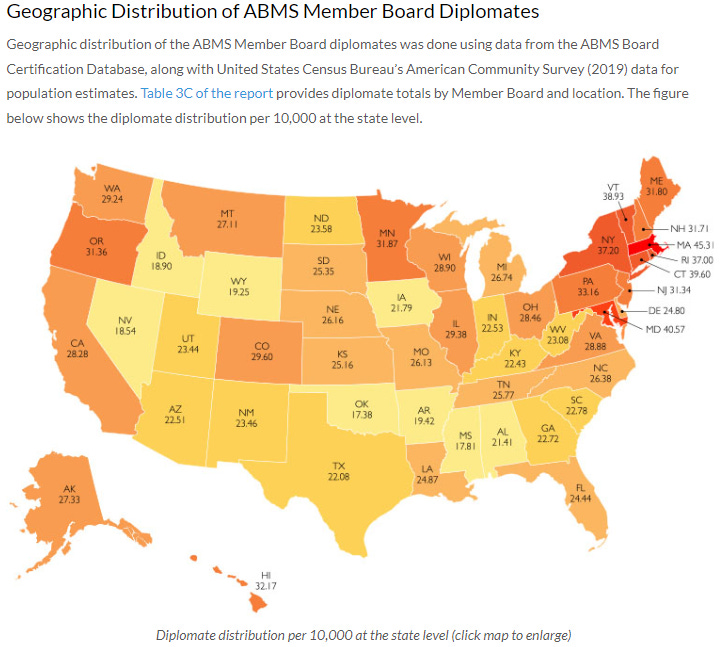Learning never stops—that goes double for medicine.
Doctors have vast knowledge but they need to remain sharp. Every year we find new diseases, innovations, and drugs. The physicians keeping up with their craft among other requirements are “board-certified.” Why should patients care for that title? After this pod, you’ll know what a board-certified doctor means as well as helpful tools to find a solid one.
It’s no secret that seeing a board-certified doctor is better than visiting someone who’s not.
What’s the signal to patients? The bottom line is competence. Getting board-certified is an extra gauntlet after med school related to your doctor’s chosen practice. Most physicians have a specialty, whether it be something like dermatology, pediatrics, or surgical kind of expertise. Medicine is at the point of having more than 40 recognized specialties and 88 sub-specialties. Once your doctor earns the official MD degree, they take a separate exam and fulfill other requirements to prove aptitude for a given category. After passing, your doctor becomes a specialist in a field like cardiology and is officially recognized by a related board (in this case the American College of Cardiology). The American Board of Medical Specialties (ABMS) and similar organizations handle that process. A certification isn’t the same as your doctor’s license. Every doctor needs to have an MD (or DO) as well as a separate certification to legally practice in a given state. Every diplomate (i.e. a board-certified doctor) has a license but not every license holder is certified. Board certification is still ‘optional.’ But think of when your teacher or boss ‘highly encourages’ you to do something. Board certification is a bit of a false choice for doctors. I’ll go over the incentives for why this is, but first you should know the scope of certification across medicine.
As of 2021, there were more than 940k diplomates based on AMBS standards. Given that the US has just over one million active physicians (as mentioned in past episodes), more than 92-93% of those doctors have a certification. There’s a little variability because >25% of doctors hold two or more board-acknowledged specialties. Though not all physicians are created equal, the sheer number of them who pass their boards will have a minimum level of knowledge to be updated in a given field. Board certification is more than 100 years old, but the need to re-certify only started in the late 90s and early 2000s. Every specialty has their own maintenance of certification (MOC) and continuing medical education (CME). These requirements can involve anything from answering mock clinical scenario questions every quarter to attending seminars on new topics. ~650k diplomates are doing active CME. That’s just 69% of recognized board holders. It’s one thing to be certified, and it’s another thing to keep up with a field all the time. Patients should take comfort in knowing that medical boards constantly adjust their exams to fit the newest practical medical knowledge. The cynics among us might say that board-certified doctors can pass an exam but can’t handle the chaotic realities of running a practice or doing tedious admin work.
Physicians still need to keep up their expertise while juggling day-to-day clinic duties.
The many little responsibilities at the clinic besides seeing patients add up fast and drain any spare time to learn about the newest drugs or procedures. The Policy and Medicine publication reviewed a 2008 study of primary physicians’ workload. The authors suggest that a doctor fields 18 patients, 23 phone calls, 17 emails, 11 imaging reports, 20 lab panels, 14 consult notes w/ other doctors and 12 Rx refills a day. That doesn’t include uncompensated time spent on chart notes, journal review, or CME. From my own experience managing a clinic, there’s pressure to see even more patients, do procedures, take calls, and then delegate refills or emails to other staff. In any case, how can we expect all our doctors to know the newest stuff? Some doctors build separate time for CME into their calendar to balance their backlog. Part of what board certification does, that patients can appreciate, is to help test doctors through such knowledge gaps. If a doctor has a pulse on new drugs, surgical techniques, and changing prevention guidance, you’ll likely benefit from treatment choices, which is a win. Given how long doctors need to train before they can see a patient, it shouldn’t be surprising that such people (mostly) enjoy learning for learning’s sake. Outside forces still play a huge role in why every doctor feels the need to be certified.
As medicine advanced during the 20th century, more hospitals demanded their physicians to be certified for various specialties, especially surgery.
The number of diplomates climbed even faster when insurance companies in the 1980s preferred to have board holders in their networks for better contract terms. Not to mention that malpractice insurers offered better rates to diplomates. By 2002, most boards required MOC and repeat exams in some form every several years (usually six to ten years). It’s hard to find a new doctor today that isn’t looking to get certified after finishing med school. Like anyone else, they need to compete for jobs as well. If nearly every active doctor passed their board exams, what does that say about care quality? Being recognized by ABMS is a signal and not a guarantee of competence. That’s not to say that non-certified doctors (with a legal state license) are better or worse. What still matters is doing a little research ahead of time when picking a doctor with or without certification.
Speaking of research, it turns out that other tools besides Google maps and reviews can help you find a doctor.
During any provider search, board certification is concrete and public info. Certificationmatters.org is by far the best resource to find a board holder in your area. On that site you can write a doctor’s name and your state—then you’ll see a readout for what board that provider’s affiliated with. Let’s say you’re in the market for a dermatologist. Certificationmatters tells you instantly if a given doctor is recognized by the American Board of Dermatology. If you have a kid needing skin care, you could also check for a dermatology and pediatric society affiliation as well. No need to call the office and wait on hold to learn the same info. Consider your medical condition to find out if there’s a certification related to your issue. If you get a hit for a physician in your area with the expertise you need, it’s worth pursuing that lead further. I’ll have a screenshot and link that page on my Substack at rushinagalla.substack.com.
A doctor’s license is public as well. Your state’s medical board (e.g. Oregon Medical Board, Medical Board of California) will have a license search page. These websites give a clear picture of a doctor’s standing if you’re unsure about a given name in your search. Red flags like an expired license or existing citation stand out. Finding and sticking with a doctor is a long quest, so take advantage of Certificationmatters and state license info so you don’t need to lean as hard on Google or a practice’s website. These little bits of reconnaissance make for a great start in finding a solid-fitting doctor. Patients are getting empowered to drive both their care and pick the right professional. We also deeply trust our tech and devices. Sometimes we believe what our smartwatch tells about our well-being more so than a trained doctor’s opinion. The next pod’s going all in on how wearables matter and don’t matter for your medical journey. Stay tuned and subscribe to Friendly Neighborhood Patient for practical healthcare tidbits. I’ll catch you at the next episode.














